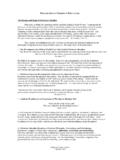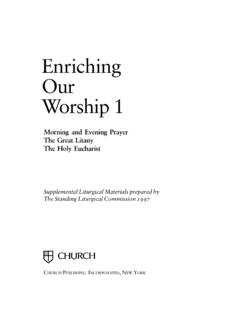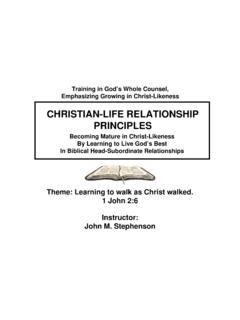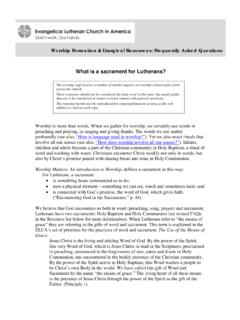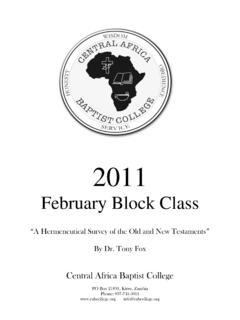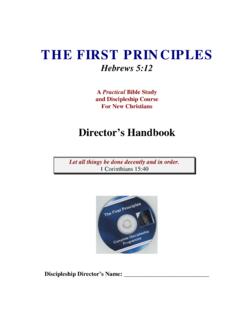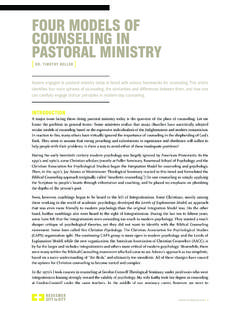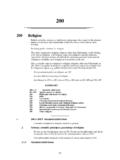Transcription of The Purpose and Scope of Christian Education The ...
1 PHILOSOPHY OF Christian Education . The Purpose and Scope of Christian Education Education , as defined by American scholar and biblical thinker Noah Webster, comprehends all that series of instruction and discipline which is intended to enlighten the understanding, correct the temper, form the manners and habits of youth, and fit them for usefulness in their future stations. Webster's definition is itself a demonstration of the chief aim of Christian Education a biblical world view. The Apostle Paul, in his treatise on the value and authenticity of Scripture, explains that All Scripture is inspired by God and is useful for teaching, for correction, for reproof, for training in righteousness, so that the man of God may be adequate, equipped for every good work.
2 (II Timothy 3:16-17). This scripture and definition reveal the very heart of Education and form the foundation for the philosophy of Education at Dayspring Christian Academy. The major tenets of this philosophy: 1. The Development of a biblical World View is the Goal of Christian Education And do not be conformed to this world, but be transformed by the renewing of your mind, that you may prove what the will of God is, that which is good and perfect and acceptable.. Romans 12:2. The Bible is the primary source for all learning. It provides, through principles of truth, the foundation from which the learner can reason to every subject and area of life.
3 The fear of the Lord is the beginning of wisdom. (Proverbs ) The Bible does not provide the necessary fact base required to gain knowledge of most subjects. However, knowledge of biblical principles is absolutely essential to develop understanding and wisdom the high orders of learning and application in any given subject. 2. Christian Character Development is Primary in the Education Process Education works from the internal to the external. First, the heart of man must be regenerated then his mind must be renewed, and finally, he will walk in a manner worthy of his calling. Christ opens the doorway into the Kingdom of God for the individual.
4 The sanctification process that ensues occurs in the character realm first and foremost, and is a lifelong progression. Lasting external change and growth comes only by way of internal character growth. And not only this, but we also exult in our tribulations, knowing that tribulation brings about perseverance; and perseverance, proven character; and proven character, hope . Romans 5:3-4. 3. Academic Excellence is an Expression of Worship of Almighty God Great are the works of the Lord;. They are studied by all who delight in them.. Psalm 111:2. As the foundation in Christian character is being laid, the academic capacity of the student is addressed and developed.
5 Each child is an expression of God's Principle of Individuality. He is seen as an individual created in God's image, unique and possessing certain gifts and qualities that set him apart from all others. As his strengths and weaknesses are identified, the Education process both affirms and stretches him, calling him up to excellence in every area of life so that he may effectively exert Christian influence in his life spheres. 4. Christian Education Requires a Christian Philosophy, Curriculum, and Methodology Education is comprised of three basic components: philosophy, curriculum, and methodology. Likewise, each and every subject that is studied has a unique philosophy (presuppositional truths), curriculum (content) and methodology (application).
6 Philosophy gives rise to both the curriculum and the methods used in studying (teaching and learning). It is the relationship of these three components that provide both the means and the ends for mastering a given subject or topic. Dayspring Christian Academy Copyright, 2004. PHILOSOPHY. Philosophy is the governor of our thoughts and actions. Philosophy gets to the heart of who we are, what we believe and why we believe it. It is closely allied with world view. Our philosophy of life is affected by our world view and at the same time affects it. There are many philosophies in the world today. Most are insidious in the way they captivate the mind and produce outcomes that would otherwise be shunned.
7 Scripture clearly warns believers to beware of vain philosophies that are patterned after the rudiments of the world rather than of Christ. A Christian philosophy of life is also termed a biblical world view. A philosophy of Education is a philosophy of government. It determines the character and the skill of the rising generation. Whether a Christian civilization will endure depends largely on the philosophy of Education that prepares those who will lead. The importance of building a Christian philosophy of Education cannot be overstated for parents, teachers, and students alike. From the earliest years, parents and teachers begin to train the philosophy of life that a child will take into adulthood.
8 Often, a person's actions expose an underlying philosophy more readily than his discourse. CURRICULUM. The curriculum is the course of study embarked upon by a student. A curriculum has an underlying philosophy, which is exposed by the subjects studied, and the facts or concepts to be mastered. The goal of any curriculum should be to discover truth. A Christian curriculum searches all things for the knowledge and wisdom of God. Great are the works of the Lord; they are studied by all who delight in them. Psalm 111:2. A curriculum should be lively and appropriate to the needs of the learner, as well as to the needs of the community as a whole.
9 Care should be taken to develop a Christian curriculum based upon the research and reasoning of the teacher who has mastered the subject from a biblical perspective. A curriculum must be academically sound and based upon truth, not on prejudiced or biased points of view. The Scope of the curriculum is the breadth and depth of the content to be studied. The Scope should always be age/ability-appropriate, while providing the challenge needed to stretch the able mind. The sequence of the curriculum should build from rudimentary knowledge and understanding to more advanced concepts and applications in a logical progression. Prerequisite skills and concepts must be in place before introducing new material.
10 The Scope and the sequence of any subject are established both within each grade level, as well as between all the grade levels in the school. The validity of each must be verified. The goal of every curriculum is to attain mastery of the subject within the context of a biblical world view. METHODOLOGY. A Christian philosophy of Education that is not evidenced in both a Christian curriculum and a Christian method of teaching will fall short of its objective to build a biblical world view into the learner. Ones'. view of God, humanity, the heart and mind, and the child has everything to do with how one practices the art and science of teaching.
